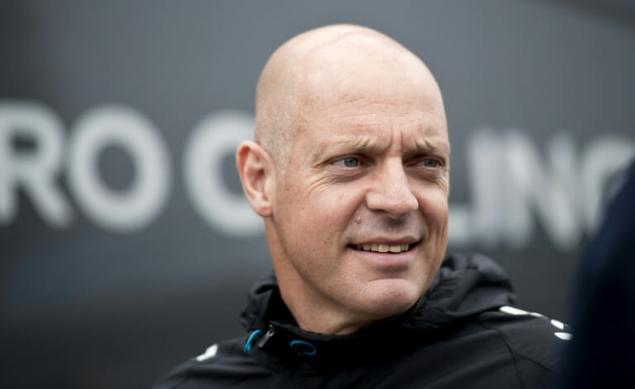733
This man has improved every little thing one percent - and that's what came out of it
In 2010, Dave Brailsford faced with a difficult task.
None of the British cyclist has not won a race "Tour de France". Brailsford as the new general manager of the «Team Sky» team (professional road cycling team Great Britain), was asked to make a difference. An approach that he used was simple.
Brailsford believed in the concept, which he called "minimum set of improvements." He explained it this way: "Better still, what do you do, exactly one per cent." Brailsford was convinced that if you improve in any area related to cycling, only one percent, then these small achievements, ultimately, will turn into a notable success.

Breylsfold and his team started with the optimization of the basic things: food, a weekly training program, ergonomic bicycle seat and tire weight.
However, they did not stop. They continued to make improvements One percent of those minor things that is constantly overlooked: pillow for sleeping, an effective gel for massage, the best way to wash hands to avoid the development of undesirable infections, and so on. They improved one percentage point everything can be had.
Breylsfold believed that if this strategy is successful, then the command «Team Sky» will be able to win in five years 'Tour de France'.
He was wrong. They won the race in three years.
In 2012, Bradley Wiggins became the first British cyclist who won the "Tour de France". In the same year the British cycling team Breylsfold preparing for the Summer Olympics. Then athletes won 70% of all gold medals.
In 2013 the team «Team Sky» repeated the feat and again won the "Tour de France". This time, the winner was the rider Chris Froome.
And now the main question: what can we learn from Brailsford?
The set of minimal improvements
It is easy to overstate the importance of defining the moment and to underestimate the significance of the adoption of improved decisions on a daily basis.
Almost all of the habits that you have - good or bad - are the result of many small decisions made by you. How easily we forget about it, when we want to make any changes in his life.
We often convince ourselves that change anything makes sense only if it will give visible results. Whether it is losing weight, starting a business, traveling around the world or any other purpose, we constantly we press on to make dramatic improvements, all of which will speak.
Meanwhile, one percent improvement is not always visible, but in the long run, they are very significant.
And as far as I'm concerned, this scheme also works in reverse. (The set of minimal impairment, in other words.) If you find yourself bad habits or get bad results, you know that it did not happen overnight, but is a combination of many small choices, one percent deviation here and there, which ultimately led to the problem.
Initially, there is no difference between the adoption of solutions that improve or worsen your life by one percent. (In other words, today is not really affect you.) However, over time these small improvements accumulate or reject, and you suddenly find a very large gap between the people who make the right decisions every day, and those who do not.
It is for this reason that I like to plan ahead for things to do to prepare for the failure and follow the rule "never make mistakes twice." Thus, you can prevent simple mistakes, avoiding the fact that they form a large snowball.
What's the whole point?
"Success - is a few simple steps, practiced every day, while failure - a set of erroneous decisions made every day.»
Jim Rohn
It is unlikely that you will ever take part in the "Tour de France", but the concept of a "minimum set of improvements" still useful to you in life.
Most people consider the success (and life in general) as an event. However, the truth is that the most important things in our lives are not isolated events, but rather the sum of all the moments, when we chose in favor of improvement or deterioration in the one percent.
The small victories and slow growth there is a certain strength. That is why the average speed gives results above average. That's why the system - is more than a goal, and mastery of habits is more important to achieve a certain outcome
. Author: Alexander Zhvakin
None of the British cyclist has not won a race "Tour de France". Brailsford as the new general manager of the «Team Sky» team (professional road cycling team Great Britain), was asked to make a difference. An approach that he used was simple.
Brailsford believed in the concept, which he called "minimum set of improvements." He explained it this way: "Better still, what do you do, exactly one per cent." Brailsford was convinced that if you improve in any area related to cycling, only one percent, then these small achievements, ultimately, will turn into a notable success.

Breylsfold and his team started with the optimization of the basic things: food, a weekly training program, ergonomic bicycle seat and tire weight.
However, they did not stop. They continued to make improvements One percent of those minor things that is constantly overlooked: pillow for sleeping, an effective gel for massage, the best way to wash hands to avoid the development of undesirable infections, and so on. They improved one percentage point everything can be had.
Breylsfold believed that if this strategy is successful, then the command «Team Sky» will be able to win in five years 'Tour de France'.
He was wrong. They won the race in three years.
In 2012, Bradley Wiggins became the first British cyclist who won the "Tour de France". In the same year the British cycling team Breylsfold preparing for the Summer Olympics. Then athletes won 70% of all gold medals.
In 2013 the team «Team Sky» repeated the feat and again won the "Tour de France". This time, the winner was the rider Chris Froome.
And now the main question: what can we learn from Brailsford?
The set of minimal improvements
It is easy to overstate the importance of defining the moment and to underestimate the significance of the adoption of improved decisions on a daily basis.
Almost all of the habits that you have - good or bad - are the result of many small decisions made by you. How easily we forget about it, when we want to make any changes in his life.
We often convince ourselves that change anything makes sense only if it will give visible results. Whether it is losing weight, starting a business, traveling around the world or any other purpose, we constantly we press on to make dramatic improvements, all of which will speak.
Meanwhile, one percent improvement is not always visible, but in the long run, they are very significant.
And as far as I'm concerned, this scheme also works in reverse. (The set of minimal impairment, in other words.) If you find yourself bad habits or get bad results, you know that it did not happen overnight, but is a combination of many small choices, one percent deviation here and there, which ultimately led to the problem.
Initially, there is no difference between the adoption of solutions that improve or worsen your life by one percent. (In other words, today is not really affect you.) However, over time these small improvements accumulate or reject, and you suddenly find a very large gap between the people who make the right decisions every day, and those who do not.
It is for this reason that I like to plan ahead for things to do to prepare for the failure and follow the rule "never make mistakes twice." Thus, you can prevent simple mistakes, avoiding the fact that they form a large snowball.
What's the whole point?
"Success - is a few simple steps, practiced every day, while failure - a set of erroneous decisions made every day.»
Jim Rohn
It is unlikely that you will ever take part in the "Tour de France", but the concept of a "minimum set of improvements" still useful to you in life.
Most people consider the success (and life in general) as an event. However, the truth is that the most important things in our lives are not isolated events, but rather the sum of all the moments, when we chose in favor of improvement or deterioration in the one percent.
The small victories and slow growth there is a certain strength. That is why the average speed gives results above average. That's why the system - is more than a goal, and mastery of habits is more important to achieve a certain outcome
. Author: Alexander Zhvakin
How to teach your baby math: Incredible Doman method
The hormone of joy: everything that you did not know about serotonin























